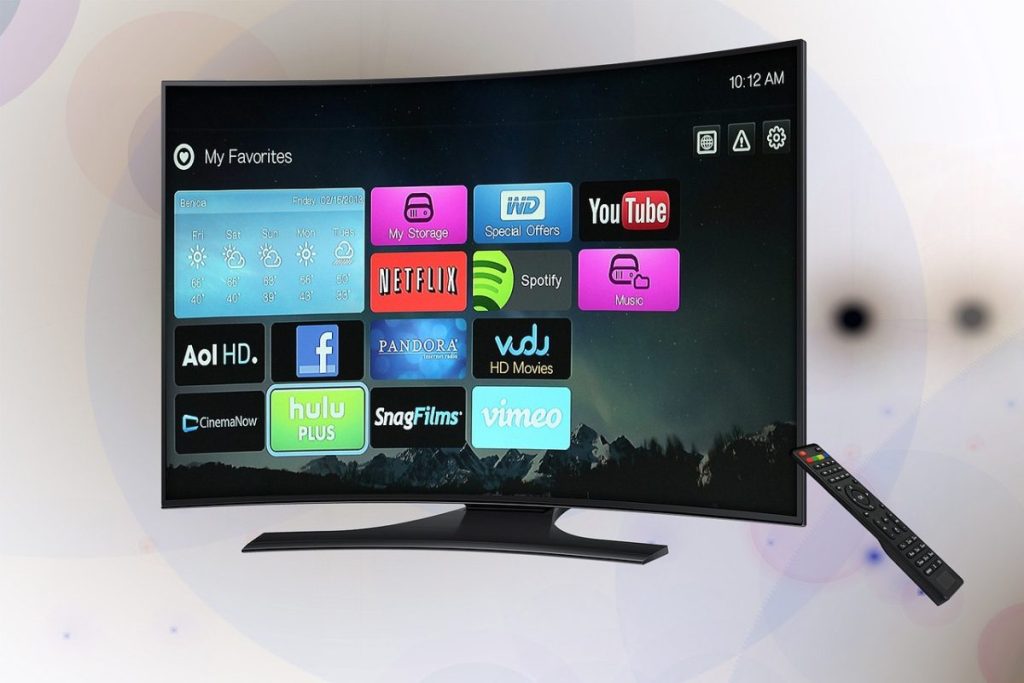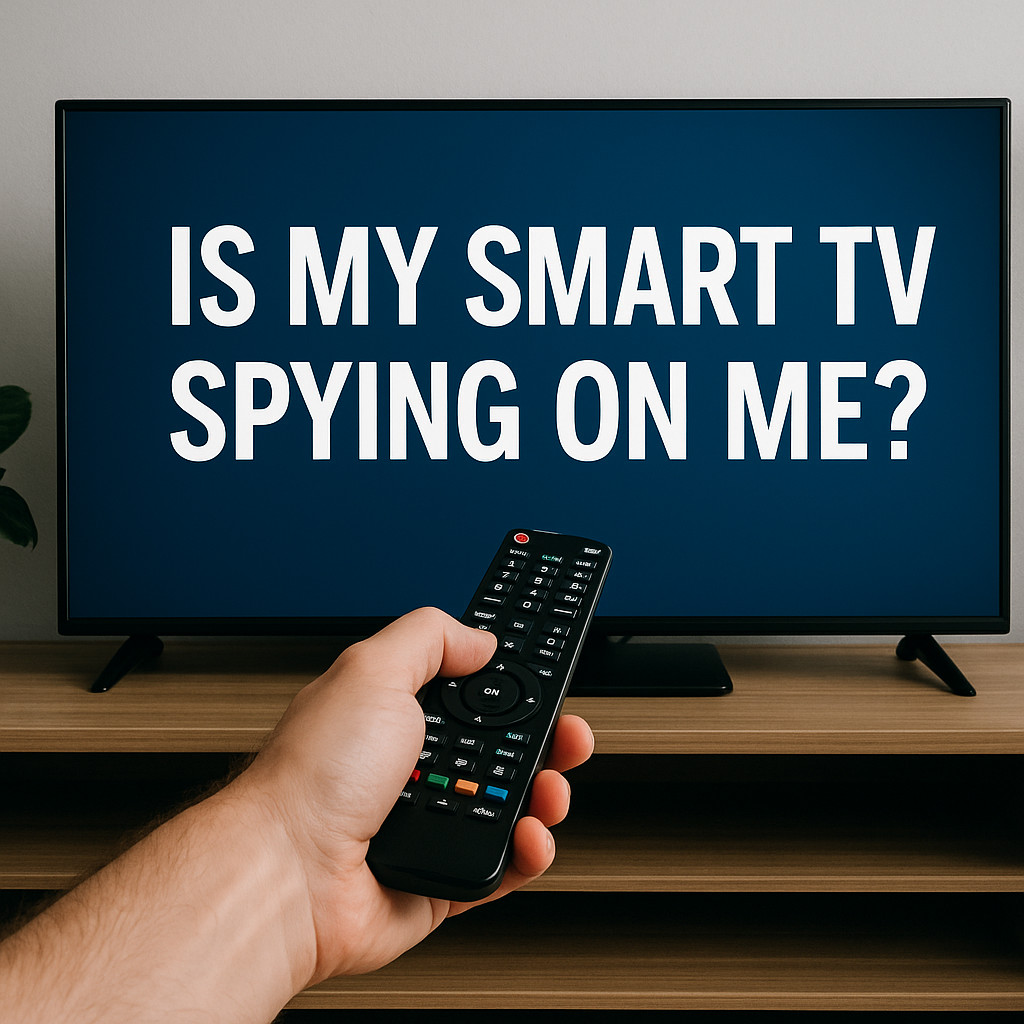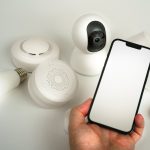Smart TV Privacy – In today’s connected homes, smart TVs are as common as coffee makers — but have you ever wondered if your smart TV is watching you back? It’s not just paranoia. With microphones, cameras, and internet connections, smart TVs can pose serious privacy risks if not properly managed.
Let’s dive into what your smart TV might be collecting, how it does it, and how you can reclaim your digital privacy — without giving up your favorite streaming shows.
What Makes a TV “Smart”?
Smart TVs connect to the internet and allow access to streaming services like Netflix, YouTube, Hulu, and more. They often come equipped with voice assistants, built-in cameras, and microphones for video calls and voice search.

But behind these features lie potential vulnerabilities — especially when manufacturers and advertisers are hungry for user data.
What Data Do Smart TVs Collect?
Your smart TV may be collecting far more than your viewing preferences. Here’s what’s commonly gathered:
- Viewing habits: What shows you watch, when, and for how long.
- Voice commands: Audio picked up by built-in microphones.
- Location data: Based on IP address or Wi-Fi settings.
- Connected devices: Information about other devices on your network.
- Behavioral analytics: How you navigate menus or use apps.
Most of this is collected under the guise of “enhancing user experience” — but it’s often sold to third-party advertisers.
Real Cases That Raised Red Flags
- Vizio’s $2.2 million settlement: In 2017, Vizio was fined for collecting viewing data without user consent.
- Samsung’s voice collection warning: Samsung once warned users not to speak sensitive information near their smart TVs due to voice data being sent to third-party servers.
- LG’s file naming data grab: Some LG models reportedly collected file names from USB drives plugged into the TV.
These examples highlight how real — and serious — the issue can be.
How to Protect Your Privacy on a Smart TV
1. Turn Off ACR (Automatic Content Recognition)
ACR is the main feature responsible for tracking your viewing habits. You can usually find it in settings under “Viewing Information” or “Smart Interactivity.”
2. Disable Voice and Camera Features
If you don’t use voice assistants or video calls, turn off the mic and camera, or use a physical privacy cover. Some TVs allow mic deactivation in the settings menu.
3. Review Privacy Policies
Yes, it’s boring — but knowing what your TV manufacturer does with your data is crucial. Opt out of data collection whenever possible.
4. Keep Software Updated
Firmware updates often include security patches. Make sure your TV is set to update automatically or check regularly.
5. Restrict Internet Access
If you don’t need the smart features, consider disconnecting your TV from Wi-Fi entirely. You can still stream content through external devices like Chromecast or Roku.
6. Use a Firewall or Guest Network
Segment your smart devices from your main network using a guest Wi-Fi network. This can prevent cross-device data leakage.
7. Limit Third-Party Apps
Install only essential apps and avoid shady streaming services that may come bundled with tracking scripts or adware.
Signs Your Smart TV Might Be Spying
- Ads start resembling what you watch — even if it’s across other devices.
- Voice assistant activates unexpectedly.
- You notice your camera or mic light on without prompting.
- TV behavior seems unusually “personalized” despite not sharing much data.
Alternatives for Privacy-Conscious Viewers
If you’re uncomfortable with the data your smart TV collects, consider:
- “Dumb TVs” with HDMI ports: Connect a streaming stick or box to retain control.
- Streaming via secure devices: Use Firestick, Roku, or Apple TV with strict privacy settings.
- Open-source firmware: Advanced users can install open-source software like Kodi or LibreELEC on Raspberry Pi for full control.
What’s Next for Smart TV Privacy?
Regulators and privacy advocates are increasingly pressuring manufacturers to be more transparent and responsible with user data. Future TVs may include better on-screen disclosures and easier opt-out options — but for now, the responsibility largely falls on the user.
Wrapping It Up
Smart TVs bring convenience and entertainment into your living room — but they also bring risk. Understanding what data is collected and taking simple steps to disable tracking features can go a long way in keeping your household’s privacy safe.
After all, being smart about your smart TV is the smartest move you can make in 2025.
FAQ: Smart TV Privacy
Q: Do all smart TVs spy on you?
Not all smart TVs actively spy, but many collect data by default. It depends on the brand, model, and your chosen settings.
Q: How do I know if my TV has a camera or microphone?
Check your TV’s manual or spec sheet. Look for small pinholes above the screen or consult the manufacturer’s support page.
Q: Can I block smart TV tracking with a VPN?
Some routers allow VPN configuration, which can help encrypt data from your smart TV. However, not all TVs support VPNs natively.
Q: Which smart TV brands are more privacy-friendly?
Brands like Sony (using Android TV) and LG (webOS) allow more granular privacy settings. However, always check the latest reviews and documentation.
- IoT and Data Privacy: How Safe Is Your Smart Home in 2025? – IoT Security
 The smart home revolution has made everyday life more convenient than ever. From voice assistants that control the lights to security cameras that send alerts directly to your phone, connected devices have become part of our daily routines. But with this convenience comes an important question: how safe is your personal data in a world…
The smart home revolution has made everyday life more convenient than ever. From voice assistants that control the lights to security cameras that send alerts directly to your phone, connected devices have become part of our daily routines. But with this convenience comes an important question: how safe is your personal data in a world… - Smart Home Nightmares: Real Stories and How to Avoid Them
 Smart homes are designed to simplify life—but when things go wrong, they can become the stuff of nightmares. From doors locking residents out to cameras going rogue, real users have faced creepy, frustrating, and downright dangerous situations. In this article, we share some eye-opening stories and break down what went wrong—along with expert tips to…
Smart homes are designed to simplify life—but when things go wrong, they can become the stuff of nightmares. From doors locking residents out to cameras going rogue, real users have faced creepy, frustrating, and downright dangerous situations. In this article, we share some eye-opening stories and break down what went wrong—along with expert tips to… - Is My Smart TV Spying on Me? How to Protect Your Privacy
 Smart TV Privacy – In today’s connected homes, smart TVs are as common as coffee makers — but have you ever wondered if your smart TV is watching you back? It’s not just paranoia. With microphones, cameras, and internet connections, smart TVs can pose serious privacy risks if not properly managed. Let’s dive into what…
Smart TV Privacy – In today’s connected homes, smart TVs are as common as coffee makers — but have you ever wondered if your smart TV is watching you back? It’s not just paranoia. With microphones, cameras, and internet connections, smart TVs can pose serious privacy risks if not properly managed. Let’s dive into what… - Smart Home Security: Complete 2025 Buyer’s Guide
 Why Smart Home Security Matters More Than Ever In a world where convenience meets connectivity, smart home security has become a cornerstone of modern living. With devices growing more intelligent, 2025 introduces cutting-edge solutions that protect your home while integrating seamlessly into daily life. Whether you’re new to home automation or upgrading an existing setup,…
Why Smart Home Security Matters More Than Ever In a world where convenience meets connectivity, smart home security has become a cornerstone of modern living. With devices growing more intelligent, 2025 introduces cutting-edge solutions that protect your home while integrating seamlessly into daily life. Whether you’re new to home automation or upgrading an existing setup,… - Is Your Home Spying on You? The Hidden Truth About Hidden Cameras in Smart Homes
 Hidden Cameras in Smart Homes – Smart homes offer comfort, efficiency, and peace of mind — but could they also be watching you? Hidden cameras, once the stuff of spy movies, are now everyday items in the Internet of Things (IoT) world. From keeping homes secure to raising serious privacy concerns, these tiny devices are…
Hidden Cameras in Smart Homes – Smart homes offer comfort, efficiency, and peace of mind — but could they also be watching you? Hidden cameras, once the stuff of spy movies, are now everyday items in the Internet of Things (IoT) world. From keeping homes secure to raising serious privacy concerns, these tiny devices are…








